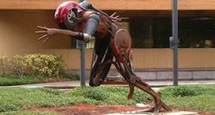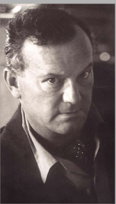COURSE STRUCTURE
Course Description
To some people, sport exists as a realm of
popular experience somehow removed or
isolated from the forces and pressures that
have come to define the rest of society. This
course seeks to explode this sporting
mythology, by highlighting the extent to which
sport is in fact a social construction, which can only be understood in relation to the social forces and relations operating within contemporary America. As such, this course encourages students to develop a truly sociological sporting imagination, with regard to their perceptions and experiences of the necessary interrelationship between sport culture and the forces, institutions, and processes, structuring contemporary American society. In doing so, this course focuses on: the relationship between sport and political, economic, and cultural institutions; the effects of commodifying, corporatizing, mass-mediating, and globalizing processes on the structure contemporary sport; the influence contemporary sport culture has on the shaping of particular of class, race, gender, age, and nation-based bodies, identities, and experiences; and, the various collective groupings–subcultural, community, national, and global–through which sport is organized and experienced within contemporary life.
Course Learning Objectives
Upon completing this course, the student will be able to:
1. [Following C. Wright Mills] Develop their own
sociologically-based sporting imaginations, through which
they will be able to identify and interpret sporting
institutions, practices, and bodies as being both constituted
and constituting elements of the contemporary American
context in which they are located.
2. Derive a better understanding of the relationship
between sport and the social, cultural, economic, political,
and technological forces and relations operating in
twenty-first century America.
3. Assess the dominant power structures, processes, and
relations in and through which contemporary sport culture operates, and examine their effects upon shaping particular class, race, gender, sex, age, and nation-based bodies, identities, and experiences.
4. Illustrate the existence of, and be able to propose solutions for, any disparities, inequalities, and/or injustices operating within contemporary sport culture.
5. Think both critically and reflexively about their own sporting experiences and bodies, and the degree to they are enabled and/or constrained by wider societal forces, structures, and power relations.
6. Synthesize and apply concepts drawn from social and cultural theorizing in critically appraising various empirical dimensions of sport.
Kinesiology Competencies Addressed in this Course
The following competencies for the Kinesiology program are addressed in this course:
1. Describe and critically analyze the role of physical activity in health, wellness, and the quality of life.
2. Know, apply, evaluate, and synthesize the knowledge regarding the social, cultural, historic, and philosophical dimensions/context of physical activity.
University Core Course Designations
Distributive Studies: Social Sciences & History-Social & Behavioural Science [SB] CORE Course Designation
You may have chosen this course as part of your CORE Liberal Arts and Sciences Studies Program, the general education portion of your degree program. CORE Distributive Studies courses are designed to ensure that you will take a look at several different academic disciplines and the way they create and analysze knowledge about the world. A faculty and student committee approved this CORE Distributive Studies course because it will introduce you to ideas and issues that are central to a major intellectual discipline and because it promises to involve you actively in the learning process. Please take advantage of the opportunities this course offers you.
Human Cultural Diversity [D] CORE Course Designation
You may have chosen this course as part of your CORE Liberal Arts and Sciences Studies Program, the general education portion of your degree program. CORE Human Cultural Diversity courses are designed to ensure that you will examine experiences, perspectives, and values different from those that are dominant in the United States or Europe. A faculty and student committee approved this CORE Human Cultural Diversity course because it will introduce you to ideas and human experiences often overlooked in the curriculum. Please take advantage of the opportunities this course offers you.
New General Education Designations:
Distributive Studies - History and Social Sciences
Diversity - Understanding Plural Societies


